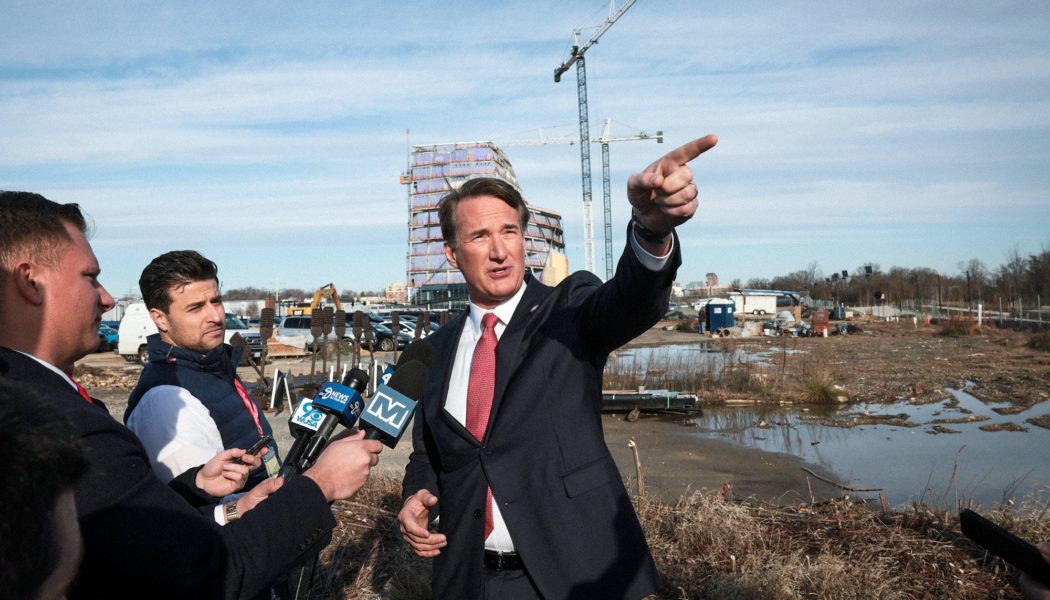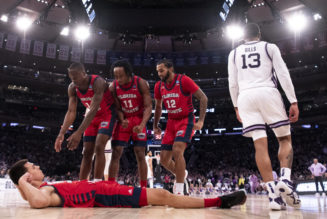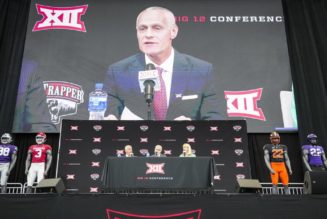The Kansas City Chiefs would appear to be a poor candidate to participate in the stadium financing extortion scheme that characterizes so much of American pro sports. The franchise has been in Kansas City since 1963, shortly after it helped to found the American Football League.* In the more than 60 years since then, the Chiefs have turned a huge swath of the lower Midwest into Chiefs Kingdom (their term) and cultivated fan passion that’s extreme even by the NFL’s standards. They sold out every game from 1990 to 2009, including in a bunch of years when the team was bad. After winning three Super Bowls in the past five seasons, the team is now a legitimate dynasty, and Arrowhead Stadium is not just packed every week but is universally regarded as one of the most raucous stadiums in football. The Chiefs are always in the league’s top 10 in attendance, and that was the case even before Patrick Mahomes, Travis Kelce, and Andy Reid started winning championships.
However, none of this has stopped the team from threatening recently to abandon the city for elsewhere if voters don’t give the team half a billion dollars. The Chiefs are hoping, it seems, that voters are either very dumb or very scared.
The franchise wants to facilitate $800 million in upgrades to Arrowhead Stadium, which would help the Hunt family that owns the team make more money. The Hunts, who are worth at least several billion dollars, say they’ll kick in $300 million. That leaves taxpayers to cover the other $500 million, before any cost overruns. The Chiefs hope that voters will OK a 40-year extension of a three-eighths-of-a-cent sales tax in Jackson County, one that costs a resident 38 cents per every $100 they spend in the county. According to the Kansas City Star, taxpayers are still paying back hundreds of millions of dollars from the last time Kansas City’s football and baseball stadiums were renovated. Major League Baseball’s Kansas City Royals are also helping to get a new ballpark out of the tax extension.
Chiefs president Mark Donovan told the city’s NBC affiliate last week that if voters didn’t extend the tax, the Chiefs “would just have to look at all our options.” A reporter asked if that meant leaving the city the team has always called home, and Donovan said, “I think they would have to include leaving Kansas City.” He then said the team would be “willing to accept a deal” to stick around its home city.
There is one region in the world where the Chiefs can maximize their business: the one they play in now. They will never, ever—ever, in a zillion years—leave the Kansas City area. They are not the other Missouri franchise, the Rams, that stopped over in St. Louis for 20 years before migrating back to a bigger market, Los Angeles, where it had previously spent half a century. And with the Rams and Chargers both taking up residence in Southern California again and the Raiders in Las Vegas, there just aren’t other American cities that lack an NFL team and would give the Chiefs the level of support they enjoy now. Chiefs owner Clark Hunt is a third-generation oil scion who inherited the team. He may or may not have any personal business acumen. But he is smart enough to know he isn’t going anywhere.
The Chiefs are making one of the least credible attempts in the history of stadium strong-arming. Not only are they are not going to leave the Kansas City area; they are unlikely even to leave the site of Arrowhead Stadium, a certainly profitable venue that is already one of the envies of the football world. Jackson County voters should tell the football team to pound sand and pay for the upgrades themselves. The Chiefs have been so successful in their hometown that they will make perfect guinea pigs for a necessary American experiment: Can taxpayers win a game of chicken against a sports team owner who is clearly bluffing?
The bluff’s flaws begin with the fact that there is nowhere in the United States for the Chiefs to go, at least nowhere distant. At most, the franchise could try to find a sugar funding deal a few miles across the border in Kansas, still within KC’s metro area. Other NFL owners are voracious about protecting their territories, and there is not a single swath of American land that does not already have a team (or two) with an entrenched foothold. Other major pro leagues have put successful teams in non-NFL cities like Portland, Salt Lake City, Orlando, Oklahoma City, and San Antonio. But the NBA teams in those cities don’t dominate regional fandom the way, for instance, the Dallas Cowboys do in Texas. And even stepping into another NFL team’s extended turf would be hugely expensive.
The Raiders agreed to pay their fellow NFL owners a nearly $400 million relocation fee to go from Oakland to Vegas. The L.A. teams agreed to pay $645 million. The amount Hunt wants from Jackson County taxpayers is $500 million, and the relocation fee alone would be in that neighborhood. All to move to a less lucrative home for the Chiefs, where he doesn’t have decades of proof that the locals will spend money supporting the team?
Hunt does not have a winning hand. His best hope is that fans who love the Chiefs get scared of an implausible outcome and vote to give him more of their money. Maybe that’s a paradox because less successful franchises than the Chiefs are trying similar moves and have more leverage.
Ted Leonsis is angling to move his Washington Capitals and Washington Wizards from D.C. to its Virginia suburbs. Leonsis has run into trouble in the Virginia Legislature, where some powerful lawmakers wonder why the commonwealth’s full faith and credit should go into a bond issuance that benefits one billionaire before anyone else. But Leonsis is likely to succeed in getting a sack of government cash from either D.C. (which is desperate to avoid losing a big downtown attraction amid a post-pandemic malaise) or Virginia (whose governor wants to build Leonsis an arena as a legacy project).
John Fisher is trying to move his Oakland Athletics to Vegas, following the Raiders. Fisher has his own funding problems, but he has a significant advantage in Vegas’ current lack of a big-league baseball team and Nevada’s desire to build Vegas into a global sports capital. Some big American cities don’t have MLB teams and could support them at levels acceptable to the league. So Fisher, even as he presides over a dumpster fire of a tanking team, has a good chance of getting the A’s out of the Bay Area.
But the Chiefs have none of these advantages, even as Mahomes and Kelce get ready to try for a fourth Super Bowl win in six years. The organization was too successful at building a fanbase in Kansas City, and other franchises were too good at taking over other regions. No move makes realistic sense for the Chiefs unless Hunt would like to be the man who moves his team to London, Berlin, or Mexico City, where the sport’s audience is growing. But even access to international markets is the subject of intense bargaining among NFL owners.
So where would the Chiefs go? Not far. The only plausible move would be across the border to nearby Kansas, but even interested lawmakers there acknowledge that landing the team is a long shot. Both the Chiefs’ and Royals’ stadiums are in an ocean of parking spaces a few miles outside of downtown. If the teams left, it would not be the same death blow to a cityscape that it might be if Leonsis succeeded in getting his teams out of D.C., so it’s worth less as leverage. And as popular as the Chiefs are, their fans may respond poorly to a move out of an iconic, longtime home to a glitzy but sterile new venue in the same area. Not to mention that building such a stadium would cost its own money and time; it would be much less convenient than renovating the existing building. And if the Chiefs do leave? The team’s Missourian fans might feel any number of ways, but it may well be a better deal to drive a short way across the border for games than to be made to buy a rich guy a stadium renovation over 40 more years. Even if the Chiefs “leave Kansas City,” there’s zero chance they go far.
Stadium funding is often a race to the bottom between local governments eager to give out the most generous tax and bond packages to corporate titans who do not need them. Congress could try to stop that race by passing national restrictions on stadium largesse, but the legislature has shown only glancing interest in the past. That gives Chiefs fans and Jackson County voters a unique opportunity to light the way for the rest of us. Their team is great and has no incentive to ever go anywhere else. No group of football fans has ever had a better chance to respond to fearmongering by pointing and laughing at it.
Correction, March 19, 2024: This article originally misstated that the Chiefs have been in Kansas City since 1960. They’ve been there since 1963.
Services Marketplace – Listings, Bookings & Reviews









